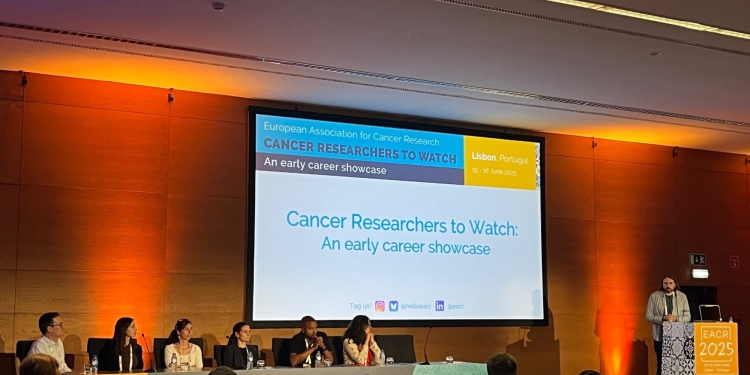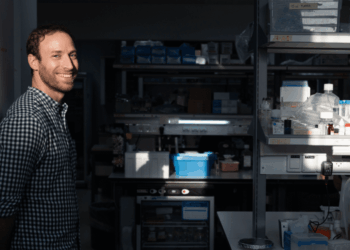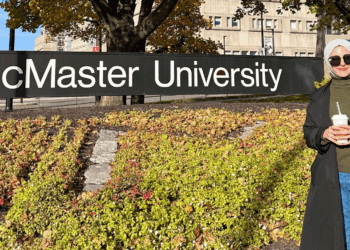 Dr. Alexandra Boitor, EACR Scientific Officer, gives a few of the highlights from Cancer Researchers to Watch: An early career showcase (Lisbon, 15-16 June 2025).
Dr. Alexandra Boitor, EACR Scientific Officer, gives a few of the highlights from Cancer Researchers to Watch: An early career showcase (Lisbon, 15-16 June 2025).
The EACR’s inaugural ‘Cancer Researchers to Watch’ took place this year ahead of the EACR 2025 Annual Congress in Lisbon, Portugal. It was designed to provide a platform for the next wave of cancer researchers and brought together 223 emerging researchers from 33 countries. Organised by and for early-career researchers, this 2-day symposium gave an additional 8 early-career researchers who submitted abstracts to the EACR 2025 Congress the opportunity to present their work alongside invited speakers and selected members of the EACR Early Career Researchers Council.
The objective of the symposium was to provide a unique opportunity for early-career researchers to present their work, discuss cutting-edge ideas and methods, as well as to build a collaborative and interactive community with their peers. The programme integrated a wide array of research topics within cancer research, covering both molecular and immunological aspects of cancer initiation, progression and plasticity, including aspects of treatment resistance and promising therapeutic approaches.
We learned more about tumour initiation from Arianna Baggiolini, Assistant Professor at the Institute of Oncology Research (Switzerland). Arianna talked about the importance of the transcriptional and epigenetic landscape (particularly the role of ATAD2) in melanoma to allow pre-existing DNA mutations to become tumorigenic. For her studies, Arianna used a human pluripotent stem cell-derived cancer model [1, 2]. Tosca Dalessi, one of the proffered papers selected from the abstracts submitted to the EACR Congress, also focused on “understanding cancer through the lenses of developmental biology” [3]. Tosca talked about the role of SoxC, a transcription factor, at the interface between colon development and colon cancer initiation [2, 4].
Venturing further with our discussions into deciphering aspects of tumour development and progression, we learned more about tumour heterogeneity from two proffered papers presented by Matteo Serra and Daniele Thomas Cotton. Using spatial transcriptomics to analyse the composition of the tumour microenvironment, Matteo uncovered new subtypes of invasive lobular carcinoma [2, 5]. Using single-cell profiling, Daniele focused his attention on the study of prostate cancer and its ability to metastasise to the bone [2].
A few other speakers at the Early-Career Showcase directed their research efforts towards the study of metastasis with a focus on circulation and extravasation. Adriana Vucetic concentrated in her proffered paper on explaining the role of erythrocytes, specifically the role of S1P, in promoting tumour cell survival in circulation [2, 6]. In another proffered paper, Cristina Liboni, told us about the role of CD24 as a molecular determinant governing the pro-tumoral role of platelets from protecting CTCs from shear stress forces and from being recognised by the immune system, to promoting seeding at secondary sites by reshaping the metastatic tumour immune microenvironment [2, 7]. Guillaume Jacquemet, Associate Professor at University of Turku (Finland) concentrated his talk on the process of extravasation, particularly in pancreatic ductal adenocarcinoma (PDAC). Using a combination of live imaging, microfluidics and single-cell analysis while integrating temporal dynamics [8], Guillaume showed that PDAC cells attach near endothelial cell junctions (clustering preferentially around CD44+ cells), gaining access to the basal extracellular matrix [9]. In his presentation, Guillaume also presented unpublished research from his lab addressing the question of how PDAC cells cross the endothelial cell wall after attachment [2].
Talks at the Early Career Showcase didn’t fail to address the impact that recent discoveries could have on the treatment of cancer. The conversation covered a range of promising approaches from targeting oncogenic signalling to exploiting metabolic vulnerabilities to immunotherapeutic strategies.
Laura Escudero, Postdoctoral Research Fellow at McMaster University (Canada) described the impact of Omomyc, a promising anti-MYC therapy for pediatric medulloblastoma in pre-clinical models [2], while Matheus de santos Dias, associated group leader at the Princess Máxima Center for Pediatric Oncology (Netherlands) presented a daring anti-cancer treatment strategy: Overactivation of oncogenic signaling [2, 10]. Andrea Morandi, Professor at the University of Florence, discussed in his talk about exploiting metabolic vulnerabilities to improve breast cancer therapy, with a focus on the role of lipid metabolism and feroptosis in ER+ breast cancer and the impact on endocrine therapy [11].
Several other speakers at the Showcase directed their attention towards the role of immune microenvironment in cancer development and the potential it holds for improving anti-cancer therapy. Maria Caffarel, Associate Professor at the Oncology Area of Biogipuzkoa Health Research Institute and Hospital Donostia (Spain) and Melanie Tichet, group leader at Georg Speyer Haus (Germany) focused on the study of macrophages. Maria explored the effect of targeting cytokine signalling to block cancer-promoting inflammation and tumour progression in breast cancer [12], with a focus on recent updates from her lab building on previous work on the role of oncostatin M, a pleiotropic cytokine, member of the IL-6 cytokine family [2, 13]. Melanie investigates the potential of reprogramming immunosuppressive tumour-associated macrophages to overcome resistance to standard-of-care therapy in melanoma [14]. Further on, Lydia Ziane Chaouche presented in her proffered paper a promising approach to CAR- T therapy: CAR macrophages combined with furin inhibition, showing data from the development of the therapy to the effect on HER2+ breast cancer in vitro [2, 15].
Another topic addressed during the Showcase, when it comes to immunotherapy, was the role of T cells. Nicole Barth, from the University of Edinburgh (UK) discussed the role that FAK plays in mediating cytotoxic interactions between cancer cells and CD8 T cells in metastatic breast cancer. Rita Acurcio, proffered paper presenter, introduced us to the use of nanomedicines to overcome stromal barriers through the recruitment of effector T cells in pancreatic cancer [2]. Silvia Brugiapaglia, another proffered paper presenter, also looked at treatment options for pancreatic cancer and presented her research on developing a vaccine that enhances chemotherapy efficacy by boosting anti-tumor immunity. The vaccine targets ENO1 – a glycolytic enzyme over-expressed in cancer cells that is implicated in tumour cell proliferation, metastasis and invasion [2, 16].
The scientific results were discussed in a relaxed environment by promoting networking, exchange of scientific ideas and participant engagement. The scientific programme was also complemented by a panel discussion with the EACR’s Early Career Researchers Council and a social event.
The event was praised for its great organisation, breadth of scientific topics covered in the programme, and opportunities for networking, with 98% of participants saying they’d recommend EACR events to others. “The showcase featured several highlights, especially the talks, which covered very interesting and current topics in cancer research,” commented one respondent to our anonymous participant feedback survey, “The diversity of themes and speakers made the sessions engaging and informative.”
EACR Conferences
At the EACR we are dedicated to providing excellent cancer research conferences where the latest research topics and interaction for participants are the very highest priorities. Make sure you add the dates of the upcoming EACR Conferences to your diary now. Don’t forget we offer member discounts on all of our registration fees!
References:
1. Baggiolini, A., et al., Developmental chromatin programs determine oncogenic competence in melanoma. Science, 2021. 373(6559): p. eabc1048.
2. Abstracts. Molecular Oncology, 2025. 19(S1): p. 1-895.
3. Van Lent, J. and A. Baggiolini, Harmony in chaos: understanding cancer through the lenses of developmental biology. Mol Oncol, 2024. 18(4): p. 793-796.
4. Dalessi, T., et al., An oncoembryology approach uncovers SoxC-driven regulation of colon development and cancer. bioRxiv, 2024: p. 2024.10.08.617191.
5. Serra, M., et al., Abstract PS18-01: Spatial Transcriptomics-Derived Classification of Invasive Lobular Carcinoma: Associations with Clinical, Genomic Characteristics, and Prognosis. Clinical Cancer Research, 2025. 31(12_Supplement): p. PS18-01-PS18-01.
6. Vučetić, A., Role of erythrocyte Gq protein in tumor metastasis. 2025: Frankfurt am Main.
7. Mittelheisser, V., et al., Tumoral CD24 tunes platelets binding and pro-metastatic functions. bioRxiv, 2025: p. 2025.04.09.648049.
8. Follain, G., et al., Time, the final frontier. Molecular Oncology, 2025. n/a(n/a).
9. Follain, G., et al., Fast label-free live imaging reveals key roles of flow dynamics and CD44-HA interaction in cancer cell arrest on endothelial monolayers. bioRxiv, 2024: p. 2024.09.30.615654.
10. Dias, M.H., et al., Paradoxical Activation of Oncogenic Signaling as a Cancer Treatment Strategy.Cancer Discov, 2024. 14(7): p. 1276-1301.
11. Lorito, N., et al., FADS1/2 control lipid metabolism and ferroptosis susceptibility in triple-negative breast cancer. EMBO Molecular Medicine, 2024. 16(7): p. 1533-1559-1559.
12. Manzano, S. and M.M. Caffarel, Cytokine-centered strategies to boost cancer immunotherapy.Molecular Oncology, 2025. 19(3): p. 579-583.
13. Araujo, A.M., et al., Stromal oncostatin M cytokine promotes breast cancer progression by reprogramming the tumor microenvironment. The Journal of clinical investigation, 2022. 132(7).
14. Tichet, M., et al., Bispecific PD1-IL2v and anti-PD-L1 break tumor immunity resistance by enhancing stem-like tumor-reactive CD8<sup>+</sup> T cells and reprogramming macrophages. Immunity, 2023. 56(1): p. 162-179.e6.
15. Ziane-Chaouche, L., et al., Inhibition of furin in CAR macrophages directs them toward a proinflammatory phenotype and enhances their antitumor activities. Cell Death & Disease, 2024. 15(12): p. 879.
16. Brugiapaglia, S., et al., The next generation DNA vaccine ENO3PEP induces effector T cell responses and promotes anti-tumor immunity in pancreatic cancer. The Journal of Immunology, 2024. 212(1_Supplement): p. 0373_4604-0373_4604.



 Dr. Alexandra Boitor, EACR Scientific Officer, gives a few of the highlights from Cancer Researchers to Watch: An early career showcase (Lisbon, 15-16 June 2025).
Dr. Alexandra Boitor, EACR Scientific Officer, gives a few of the highlights from Cancer Researchers to Watch: An early career showcase (Lisbon, 15-16 June 2025).




